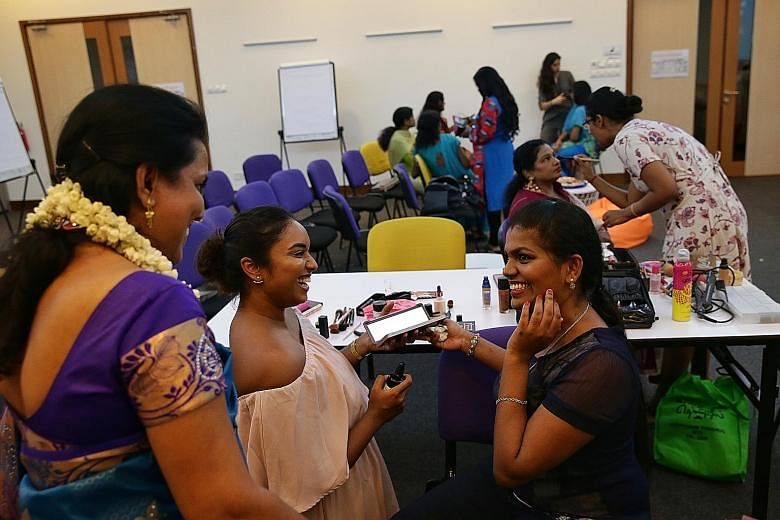Asking for directions, ordering food and visiting the doctor may seem like simple tasks, but they can be daunting for foreign domestic workers in Singapore who speak little English.
A group of volunteers is now aiming to change this - by running free, fortnightly classes that help these women from Tamil Nadu and Kerala, in India, and Sri Lanka navigate everyday scenarios here.
Through a mix of role-playing sessions and practical lessons, they build up their confidence in spoken English and familiarise themselves with vocabulary such as "stomach-ache", "teh c" - and "port of embarkation", a term often encountered at immigration checkpoints.
"They don't need to have perfect grammar," said volunteer Sindhura Kalidas, 30, who heads the English classes. "They just want to fit in."
The youth-led initiative, known as Women of Shakti, started in February last year and now runs under the auspices of the Humanitarian Organisation for Migration Economics and Singapore Indian Development Association (Sinda). It is helmed by three volunteers - recent graduate A. Aarthi, 25, marketing associate Vaishnavi Naidu, 29, and Ms Kalidas, who teaches at a private enrichment centre - and some domestic workers.
The group's 25 regular students, who speak Tamil or Malayalam as their first language, go to Sinda in Beatty Road for classes.The group has also roped in volunteers to run workshops on topics such as financial literacy and health and wellness.
Co-founder Ms Aarthi said the group caters to the needs of domestic workers from South Asia because - unlike their counterparts from the Philippines and Indonesia - they tend to have more tenuous support networks, speak little English and do not know where to go for help.
Ms Aarthi, who graduated from the National University of Singapore with a master's in sociology, said: "(They) have told me they see themselves as the lowest in the domestic worker hierarchy."
The group, she said, aims to give them the space to pick up new skills, pursue their interests and form friendships with one another.
Ms Malar Tharmalingam, 40, arrived here from Tamil Nadu eight years ago and sends money home to her widowed sister and nephew every month. The economics graduate, who fell on hard times after her parents died, said: "I want to be able to speak English to my employer... I want to teach my nephew English."
Ms Aarthi hopes Women of Shakti will one day be run by the domestic workers themselves.
Aside from lessons, the group organises trips to parts of the island, such as the Indian Heritage Centre, and members have taken part in events like the Migrant Worker Poetry Competition and a storytelling workshop at Sing Lit Station.
• To find out how you can contribute, e-mail womenofshakti.sg@gmail.com or visit facebook.com/womenof shakti.sg and www.instagram.com/womenofshakti.sg


